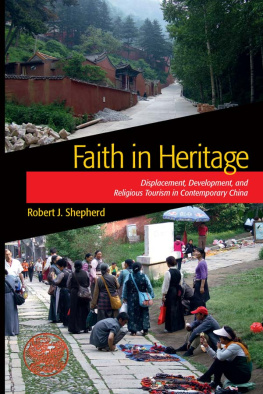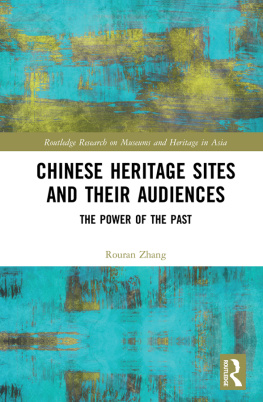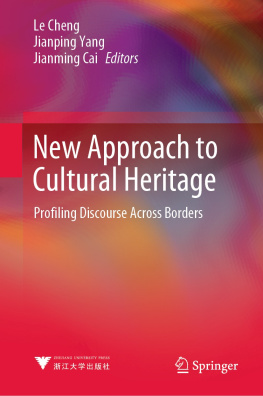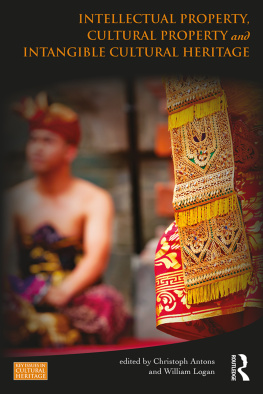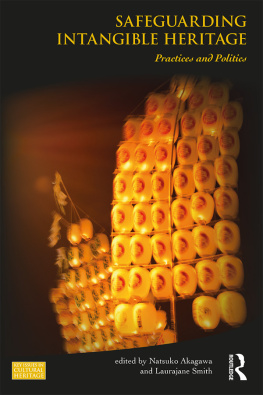Sociology of World Heritage
Taking mainly Japanese and other Asian case studies as examples, Ogino examines the motivations behind the preservation of objects and sites considered to be of cultural significance.
Using mainly the perspectives of Japanese approaches to cultural heritage, the book critiques the European logic of cultural heritage enshrined by UNESCO. It contrasts a Western emphasis on monuments and sites, with an Asian emphasis on more intangible forms of heritage, which place less emphasis on a linear view of time. More practically, the authors also analyze the positive and negative impacts that UNESCO-listed status has had on sites in Asia, including Angkor Wat, Nagasaki, and Lijiang. Finally, they address fundamental questions about who gets to decide what counts as cultural heritage, and what the underlying rationale is for actively preserving heritage in the first place.
This book is a thoughtful and provocative analysis of issues that will be of interest to sociologists, as well as scholars and students of cultural heritage.
Masahiro Ogino is Professor of Sociology at Kwansei Gakuin University, Nishinomiya, Japan.
Routledge Advances in Sociology
Domestic Economic Abuse
The Violence of Money
Supriya Singh
The Paradigm of Social Interaction
Nikolai Genov
Identifying and Managing Risk at Work
Emerging Issues in the Context of Globalisation
Edited by Chris L. Peterson
The New Sociology of Ageing
Martin Slattery
The Class Structure of Capitalist Societies, Volume 2
Social Space and Symbolic Domination in Three Nations
Will Atkinson
We, Other Utopians
Recombinant DNA, Genome Editing, and Artificial Life
Eva lesingerov
Sociology of World Heritage
An Asian Perspective
Masahiro Ogino
Paramilitary Groups and the State under Globalization
Political Violence, Elites, and Security
Edited by Jasmin Hristov, Jeb Sprague and Aaron Tauss
The Disfigured Face in American Literature, Film, and Television
Cornelia Klecker and Gudrun M. Grabher
For more information about this series, please visit: www.routledge.com/Routledge-Advances-in-Sociology/book-series/SE0511
First published 2022
by Routledge
2 Park Square, Milton Park, Abingdon, Oxon OX14 4RN
and by Routledge
605 Third Avenue, New York, NY 10158
Routledge is an imprint of the Taylor & Francis Group, an Informa business
2022 Masahiro Ogino
The right of Masahiro Ogino to be identified as author of this work has been asserted by him in accordance with sections 77 and 78 of the Copyright, Designs and Patents Act 1988.
All rights reserved. No part of this book may be reprinted or reproduced or utilised in any form or by any electronic, mechanical, or other means, now known or hereafter invented, including photocopying and recording, or in any information storage or retrieval system, without permission in writing from the publishers.
Trademark notice: Product or corporate names may be trademarks or registered trademarks and are used only for identification and explanation without intent to infringe.
British Library Cataloguing-in-Publication Data
A catalogue record for this book is available from the British Library
Library of Congress Cataloguing-in-Publication Data
Names: Ogino, Masahiro, 1957 author.
Title: Sociology of world heritage : an Asian perspective / Ogino Masahiro.
Description: New York : Routledge, 2021. | Series: Routledge advances in sociology | Includes bibliographical references and index.
Identifiers: LCCN 2021029244 (print) | LCCN 2021029245 (ebook) | ISBN 9780367857608 (hardback) | ISBN 9781032138152 (paperback) | ISBN 9781003014904 (ebook)
Subjects: LCSH: World Heritage areasSocial aspectsAsia, East. | Cultural propertySocial aspects.
Classification: LCC G140.5 .O45 2021 (print) | LCC G140.5 (ebook) | DDC 363.6/9095dc23
LC record available at https://lccn.loc.gov/2021029244
LC ebook record available at https://lccn.loc.gov/2021029245
ISBN: 978-0-367-85760-8 (hbk)
ISBN: 978-1-032-13815-2 (pbk)
ISBN: 978-1-003-01490-4 (ebk)
DOI: 10.4324/9781003014904
Typeset in Galliard
by Apex CoVantage, LLC
Preface
I started to study, from a socio-anthropological point of view, the issue of cultural heritage when Henri-Pierre Jeudy asked me in 1994 to write an article for the journal Ethnologie Franaise, on heritage in Japan, in particular, on intangible cultural heritage, a specifically Japanese notion. The continuous discussion with Henri-Pierre Jeudy paved the way for a larger Japanese-French collective research on the issue with two other French researchers, Franois Sguret and Marc Abls, and three Japanese researchers, Kenichi Wakita, Nobuhiko Ogawa, and Yoshiyuki Yama, from 1997 to 2000. We organized a conference at the Ecole des Hautes Etudes en Sciences Sociales and published research results as a collective book in Japanese in 2002. This book has unexpectedly echoed in the sociological community and other disciplines in Japan. The issue of intangible cultural heritage has also attracted the attention of Chinese scholars, and the China Society for Anthropology of Art has invited me to give a lecture several times since 2010. The participation in the workshop and conference Cultural Heritage? in East Asia, organized in 2010 by the Sainsbury Institute for Study of Japanese Arts and Cultures, in which Akira Matsuda and Luisa Elena Mengoni played a crucial role, allowed me to deepen the reflection on the question.
The rise of these interests toward the question of cultural heritage is closely related to a global transformation. I had already alluded, in the first article in French, to the underlying relationship among cultural heritage institutions, the nation-state, and the market economy. But I increasingly felt the need to take into account the global dimension of the issue with the growing influence of World Heritage institutions. That is why I undertook, together with Mayumi Yukimura, the research on the relationship between the globalizing effects of World Heritage institutions in different societies, especially in Japanese society.
Having said that, and despite the subtitle given to this book, that is, Asian Perspective, it is not intended to make a naive culturalist contrast between the East and West. If this book focuses mainly on Japan and non-European countries, it is because these societies show more explicitly the effects brought about by World Heritage institutions. However, this does not prevent us from seeing the same effects in European societies, in which I also conducted the survey.
This global transformation allows us to reflect on two issues. The first is the question of the relationship between cultural heritage institutions, the state, and the capitalist system. The capitalist system is, by its nature, globalizing, but this characteristic has been accelerating since the 1980s. Curiously, World Heritage institutions were implemented at the same time. The national cultural heritage institutions were then influenced by it. This globalization, both economic and cultural, and the national and nationalist resistance to it, should be a major focus of sociological research. Second, this sociological question must be analyzed in terms of time and space, as some social scientists point out through other research fields. I would be very happy if this book could give rise to further reflection on the question of timespace.


